MCQ ON CELL CYCLE AND CELL DIVISION class 11 for NEET | CELL CYCLE AND CELL DIVISION class 11 MCQ | CELL CYCLE AND CELL DIVISION with Answer | Check the below NCERT MCQ question for class 11 Biology chapter 10 based on the CELL CYCLE AND CELL DIVISION with Answers.
MCQ on CELL CYCLE AND CELL DIVISION class 11 Biology with answers were prepared based on the latest pattern.We have provided class 11 Biology MCQs questions on CELL CYCLE AND CELL DIVISION with Answers to help students understand the concept very well.
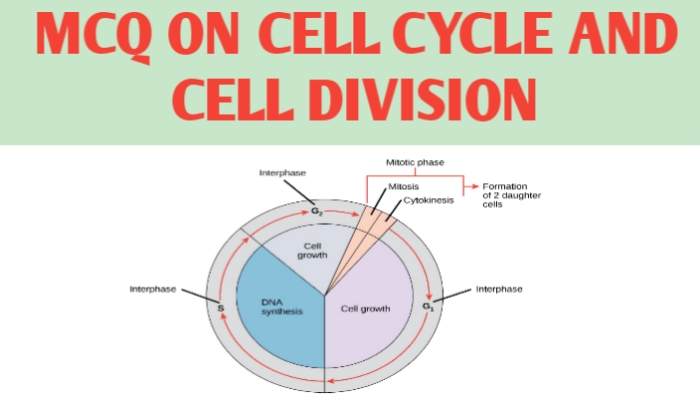
MCQ ON CELL CYCLE AND CELL DIVISION
MCQ CELL CYCLE AND CELL DIVISION is useful for NEET / CSIR / UGC / CBSE / ICSE / AIIMS / EXAM / AFMC EXAM / STATE LEVEL MEDICAL EXAM 2022-23
Introduction:-
Are you aware that all organisms , even the largest , start their life form a single cell ? Growth and reproduction are characteristics of cells , indeed of all living organisms.All cells reproduce by dividing into two , with each parental cell giving rise to two daughter cells each time they divide.These newly formed daughter cells can themselves grow and divide , giving rise to a new cell population that is formed by the growth and division of a single parental cell and it’s progeny.
MCQ ON CELL CYCLE AND CELL DIVISION class 11 for NEET
1. The cell cycle of human cells approximately is
(a) 20 hours
(b) 24 hours
(c) 30 hours
(d) all the above
Ans (b) 24 hours
2. Division of nucleus is
(a) karyokinesis
(b) cytokinesis
(c) M phase
(d) All the above
Ans. (a) Karyokinesis
3. Division of cytoplasm is
(a) Karyokinesis
(b) cytokinesis
(c) interphase
(d) none
Ans. (b) cytokinesis
4. The phase corresponds to the interval between mitosis and initiation of DNA replication is
(a) G1 phase
(b) interphase
(c) G2 phase
(d) S phase
Ans.(a) G1 phase
5.The period during which DNA synthesis or replication takes place is
(a) G1 phase
(b) G2 phase
(c) S phase
(d) all the above
Ans.(c) S phase
6. If the cell has diploid or 2n number of chromosome at G1 , even after S phase the number of chromosome is
(a) 4n
(b) 2n
(c) 8n
(d) 6n
Ans.(b) 2n
7. In animal cells, during the S phase ,DNA replication begins in
(a) cytoplasm
(b) nucleus
(c) mitochondria
(d) cellulose
Ans.(b) nucleus
8. In animal cells during S phase of , DNA replication begins in the nucleus and centriole duplicates in the
(a) nucleus
(b) cytoplasm
(c) ribosomes
(d) mitochondria
Ans.(b) cytoplasm
9. Proteins are synthesised in preparation for mitosis while cell growth continues.
(a) G1 phase
(b) G2 phase
(c) S phase
(d) Go phase
Ans. (c) S phase
ALSO READ:-
● YOU CAN WATCH BIOLOGY SIR Youtube channel
10.The cells that don’t divide further exit G1 phase to enter an inactive stage called
(a) quiescent stage (Go)
(b) S phase
(c) G 1 phase
(d) G 2 phase
Ans. (a) quiescent stage
11. In animals , mitotic cell division is only seen in the diploid
(a) germ cell
(b) somatic cells
(c) both a and b
(d) mitochondria
Ans.(b) somatic cells
12. The plants can show mitotic divisions in
(a) haploid cells
(b) diploid cell
(c) both a and b
(d) triploid cell
Ans.(c) both a and b
13. The phase which is marked by the initiation of condensation of chromosomal material.
(a) prophase
(b) metaphase
(c) anaphase
(d) all the above
Ans. (a) prophase
14. At the metaphase stage , metaphase chromosome is made up of two sister chromatids , which are held together by the
(a) centromere
(b) kinetochore
(c) chromatids
(d) none of above
Ans.(a) centromere
15. Which phase is characterized by centromeres split and chromatids separate , chromatids move to opposite poles.
(a) prophase
(b) metaphase
(c) anaphase
(d) all the above
Ans. (c) anaphase
16. Nucleolus , Golgi complex and ER reform at which phase of mitosis
(a) prophase
(b) metaphase
(c) anaphase
(d) telophase
Ans.(d) telophase
17. A very significant contribution of mitosis is
(a) cell repair
(b) cell destroy
(c) restore the nucleo – cytoplasmic ratio
(d) both a and c
Ans.(d) both a and c
18. The division in the merismetic tissues the apical and the lateral cambium , result in a continuous growth of plant throughout their life.
(a) meiosis
(b) mitosis
(c) both a and b
(d) amitosis
And.(b) mitosis
19. The specialised kind of cell division that reduces the chromosome number by half results in the production of haploid daughter cells.This kind of division is called
(a) mitosis
(b) meiosis
(c) amitosis
(d) All the above
Ans. (b) meiosis
20. Synopsis occurs in
(a) leptotene
(b) zygotene
(c) pachytene
(d) all the above
Ans.(b) zygotene

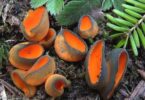

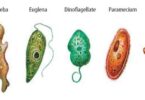
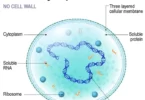
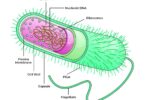
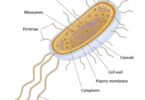
Leave a Comment